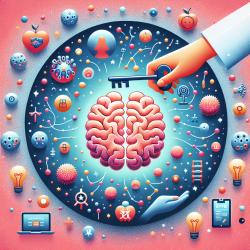As a speech-language pathologist committed to leveraging data-driven decisions, the integration of artificial intelligence (AI) into psychological interventions presents an exciting frontier. The research article, "Application of Artificial Intelligence on Psychological Interventions and Diagnosis: An Overview," offers a comprehensive examination of AI's potential to revolutionize mental health care, particularly in diagnosing and treating psychological disorders.
Key Findings from the Research
The research highlights several promising applications of AI, including deep learning (DL) techniques, in psychological assessment and therapy:
- Enhanced Diagnostic Accuracy: AI can analyze vast datasets to identify patterns and risk factors associated with mental health disorders. This capability can significantly improve early diagnosis and intervention, which is crucial for children with developmental disorders.
- Personalized Interventions: AI-driven tools can tailor interventions to individual needs, enhancing the effectiveness of treatments. For example, AI can help design customized speech therapy programs for children with autism or ADHD.
- Remote Accessibility: AI applications can provide therapeutic support remotely, making mental health services more accessible to children in underserved areas.
Implementing AI in Your Practice
To integrate AI into your therapeutic practice, consider the following steps:
- Stay Informed: Keep up-to-date with the latest research on AI applications in mental health. Reading studies like the one by Zhou et al. can provide valuable insights.
- Leverage AI Tools: Utilize AI-based tools and platforms designed for speech-language therapy. These tools can assist in diagnostics, treatment planning, and monitoring progress.
- Collaborate with Tech Experts: Work with AI specialists to understand the technical aspects and ensure ethical implementation of AI in your practice.
- Focus on Data Privacy: Ensure that all AI applications comply with data privacy regulations to protect patient information.
Encouraging Further Research
While AI shows great promise, continued research is essential to address its limitations and ethical concerns. Practitioners are encouraged to contribute to and stay engaged with ongoing studies to refine and enhance AI applications in therapy.
To read the original research paper, please follow this link: Application of Artificial Intelligence on Psychological Interventions and Diagnosis: An Overview.










